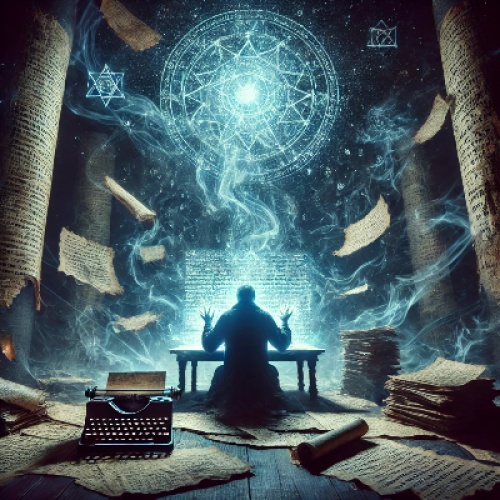For twenty years, Alistair had chased shadows. He'd deciphered Sumerian cuneiform detailing the "Unmaking Formula," painstakingly translated Mayan codices hinting at the "Cosmic Reset Button," and unearthed Egyptian scrolls warning of the "Serpent's Whisper," the knowledge that unravels reality. Each fragment pointed to the same terrifying truth: a fundamental flaw, or perhaps a pre-programmed failsafe, built into the very fabric of existence. A truth so volatile, so dangerous, that thinking about it, writing about it, even knowing about it, was a death sentence.
His colleagues called him mad. The University funding dried up years ago. His wife, Eleanor, left, unable to bear the sleepless nights, the frantic scribbling, the growing paranoia. But Alistair didn't care. He was on a quest for ultimate knowledge, a quest fueled by an insatiable curiosity and a grim acceptance of the potential consequences.
He sat in his cluttered, book-lined study, the air thick with the scent of old paper and dust. The papyrus lay before him, illuminated by the pale glow of his desk lamp. He was using a custom-built device, a Faraday cage lined with lead, designed to theoretically disrupt any potential "cosmic erasing field" that might emanate from the Codex's information. He knew it was probably futile, a pathetic attempt to outsmart a force beyond human comprehension, but he had to try.
He began to type, his fingers dancing across the keyboard. He wrote about the interconnectedness of ancient myths, the recurring themes of universal cycles of creation and destruction, and the warnings against seeking knowledge that was never meant to be known. He wrote about the strange disappearances of other scholars, the cryptic notes they left behind, filled with nonsensical symbols and frantic pleas for forgiveness.
He felt a growing unease, a creeping sense of dread that settled in his bones. He could almost feel the weight of the universe pressing down on him, a silent judgment, a cosmic disapproval. He ignored it, pushing forward, driven by the compulsion to document, to understand.
The hieroglyphs on the papyrus seemed to writhe before his eyes, rearranging themselves into new, unsettling patterns. The monitor of his computer flickered, the words on the screen blurring and distorting. He felt a sharp pain in his head, a searing pressure behind his eyes. He gasped, clutching his temples, fighting to maintain his focus.
He had to write it down. He had to explain it.
He typed: "The Codex... is not a book... but a..."
The lights flickered and died, plunging the room into darkness. Alistair cried out, a strangled sound lost in the sudden silence. He fumbled for his lighter, his heart pounding in his chest. A small flame flickered to life, casting dancing shadows on the walls.
He looked back at the computer screen. The last line he had typed was gone. Erased. As if it had never been.
He shivered, a primal fear gripping him. He knew what this meant. He was too close. He was on the verge of uncovering the truth, and the universe was fighting back.
He took a deep breath and began to type again. He would not be silenced. He would not be erased.
He wrote: "The Codex is not a book, but a..."
Again, the lights died. Again, the words vanished.
He continued this macabre dance, typing, erasing, typing, erasing, his desperation growing with each failed attempt. He was racing against time, against the inevitable.
Finally, with trembling hands, he typed the final word: "thought."
He paused, holding his breath, waiting for the darkness, the erasure. But nothing happened. The light flickered steadily, illuminating the word on the screen. "Thought."
He stared at the word, his mind reeling. It was so simple, so obvious. The Codex wasn't a physical object, a tangible thing that could be destroyed or contained. It was a concept, an idea, a thought process so dangerous that merely contemplating it could unravel reality.
He understood. He finally understood.
And as the understanding solidified in his mind, he began to fade. Not with a violent erasure, but slowly, subtly, as if he were being erased from existence, one memory, one thought, one atom at a time.
The lighter fell from his hand, extinguished on the floor. The room was plunged into absolute darkness.
The computer sat silently, displaying a single, haunting word: "Thought."
The room remained empty. The papyrus lay undisturbed on the desk. The Lost Codex of the Universe remained a secret, locked away in silence, eternally guarded by the terrifying price of knowledge. And somewhere, perhaps, a faint echo of Alistair Humphrey still whispered the terrible truth, a warning carried on the cosmic winds, a thought too dangerous to be spoken, too profound to be forgotten, and too powerful to remain known.





